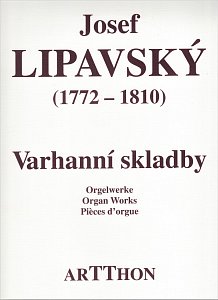Lipavsky, Josef: Organ Works
 Bestsellery
Bestsellery
 Właśnie zakupione
Właśnie zakupione
| Wydawnictwo: | ARTTHON |
| styl muzyczny: | muzyka klasyczna i liturgiczna |
| aranżacja : | fortepian |
| obsada: | solo |
| Stopie: |
średnio zaawansowany
bardziej zaawansowany |
| format: | książka |
| seria: | Czech composer |
Dane
| Kod produktu: | ART404008 |
| kompozytor: | Lipavský, Josef |
| ilość utworów: | 7 |
| ilość stron: | 44 |
| język : |
angielski
niemiecki francuski czeski |
| rozmiar: | 23 x 31 cm |
| ISMN: | 9790900404008 |
| waga: | 316 g |
Spis utworów (7)
- Fuga na Cherubiniho téma / Fugue on a Theme of Cherubini (Es dur / Eb major)
- Fuga I (D dur)
- Fuga II (d moll)
- Fuga III (A dur)
- Fuga IV (a moll)
- Fuga V (C dur)
- Fuga VI (c moll)
Opis produktu
This publication brings you seven organ pieces by Josef Lipavsky, a Czech composer who is not well known in the Czech Republic because he lived most of his life in Vienna. However, his compositions deserve special attention, his post-baroque conception of the pieces stands out for its distinctive harmonic richness, tectonic construction and unexpected scope.
The book is supplemented by a historical study by Jiří Sehnal on organs and organ music after the Josephine reforms and an editorial and critical report by Tomáš Thon.
Josef Lipavský (1772 – 1810) was a Czech organist, composer and teacher who lived most of his life in Vienna. He was musically gifted from childhood. He studied organ playing with Ignác Haas in Hradec Králové and philosophy in Prague. He subsequently went to Vienna, where he studied law and also completed piano studies with G. Pasterwitz, J.K. Vanhala and W.A. Mozart. His pedagogic skills led to him being a domestic piano teacher for several aristocratic families, but he also worked in the civil service. Carl Czerny wrote in his biography about him that he was a great sheet music player and famous for his interpretations of Bach fugues.









